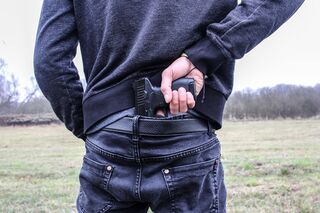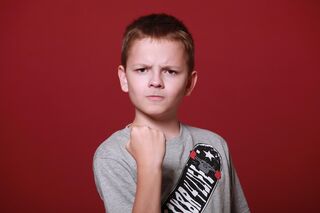Coronavirus Disease 2019
Will Mass Shootings Be Affected by the Coronavirus Pandemic?
A look at possible effects of pandemic lockdowns.
Posted August 29, 2022 Reviewed by Hara Estroff Marano
Key points
- Childhood traumas and deficient social connectedness are prevalent among mass shooters.
- Mass shooters often have psychological traits of self-superiority, narcissism, and high self-esteem.
- Mass shootings are planned in advance, disclosed to others, and researched online.
- It's unclear what the effect of pandemic lockdowns and missed schooling will be on the incidence of mass shootings.
Will the coronavirus pandemic increase or decrease the likelihood of mass shootings? There is an array of background risk factors, life experiences, psychological traits, and behaviors that mass shooters have in common. What may happen to these as the coronavirus pandemic reveals its fallout on our youth?
Let’s examine the studied and reported characteristics of mass shooters. Then we’ll see how the pandemic may affect these attributes.

Backgrounds and Sociodemographic Characteristics
Criminologists Jillian Peterson, Ph.D.,and James Densley, Ph.D., find that the path to becoming a perpetrator of mass shootings is littered with poor treatment of children and youth and with difficult family circumstances. They studied 180 mass shooters since 1966. Childhood trauma is common, along with family violence, emotional or sexual abuse, absent or neglectful parents, parental suicides and other losses, and bullying. There may be substance abuse among perpetrators. Males outnumber females. Teens and young adults predominate.
Psychological Traits
In his 2017 article in American Bhavioral Scientist, “Narcissism, Fame Seeking, and Mass Shootings,” Brad J. Bushman of Ohio State University cites the “large egos and narcissistic tendencies” of mass shooters. Contrary to popular belief, Bushman says perpetrators often have high self-esteem, with self-centeredness, large egos, and self-views of superiority.
These youth typically resort to externalizing blame for insults to their sense of superiority, say Baumeister, Smart, and Boden in "Relation of Threatened Egotism to Violence and Aggression: The Dark Side of Self-Esteem." These insults may include school suspensions or expulsions or romantic rejections. This externalization of blame can lead to finding fault with a group of others from whom they feel outcast or rejected. When their self-view of superiority is threatened, such youth can make threats of violence to others.
Experiences
In The Violence Project: How to Stop a Mass Shooting Epidemic, Peterson and Densley reveal that mass shooters may have poor social connectedness, due to family difficulties and poor support in childhood. They may be left to cope on their own without much parental supervision. They may lack other adult connections such as extended family. These youth can experience isolation, may lack supportive peer groups and, due to bullying, may be rejected by peers. They may feel despair, hopelessness and isolation. They may have suicidal impulses and/or a history of suicide attempts.

Behaviors
In Rampage: The Social Roots of School Shootings, Katherine S. Newman et.al discuss how mass shooters develop anger when they externalize blame onto others instead of accepting responsibility for their actions and feelings. They also identify with other mass shooters and research them online, reports Bushman. This identification emboldens them.
They plan their mass shooting event weeks to months in advance. They let others know of their plans both online and verbally, informing others of their homicidal and suicidal intents.
Often, they target their current or former schools or groups with whom they have associated. Sometimes they write manifestos prior to the shooting. They may invent accomplishments they have never had.
Possible Negative Effects of the Coronavirus Pandemic
The Adolescent Brain Cognitive Development Study is the largest long-term study of brain development and child health in the U.S. Data from the ongoing study show the detrimental effects on emotional well-being of adolescents during the pandemic. These include “poorer quality and functioning of family relationships” that reveal diminished social connections.
In a meta-analysis of 16 worldwide studies of adolescent mental health during the pandemic, Elizabeth A.K. Jones, Amal K. Mitra, and Azad R. Bhuiyan cite higher rates of depression, anxiety, and substance use, the latter even when adolescents are sequestered at home.
In their longitudinal study of youth mental health, Maya L. Rosen, et. al found less contact by youth with peers, school teachers, and extended family. These all created an increased vulnerability to emotional distress in youth. During the pandemic, structure and adult supervision may be less. Many youth have dropped off the educational grid and do not attend online classes.
Adolescents may be more isolated from peers and other adults when schools, scouts, and sports activities shut down. They miss out on adult supervision and contact, not only at home but also at school. School often compensates for poor home interpersonal interactions with family.
The coronavirus pandemic may worsen the constellation of factors that lead to mass shootings. This might happen for several reasons. The pandemic has diminished social interaction, so crucial to adolescent development. Isolation has worsened due to school shutdowns and reliance on online instruction.
Classroom structure has disappeared as have student-teacher interactions in the flesh. There are more school dropouts. There is an increase in stress, depression, anxiety and family difficulties––job losses, death of family members from coronavirus infections, financial difficulties, substance abuse, lessened adult supervision of children and youth. Together these may create the perfect storm for more emotional suffering in youth that can lead to mass shootings.
Possible Beneficial Effects of the Pandemic
Alternatively, data from the meta-analysis by Jones, Mitra, and Bhuiyan reveal that some youth find strengthened interpersonal interactions and support from forced family togetherness during lockdowns. Families living together in close quarters interact more often. Some children show improved well-being from the togetherness and from parent-adolescent discussions during lockdowns.
Some potential mass shooters may have some of their risks attenuated by having more attentive adults around them, both at home and from extended relatives, say Jones, Mitra, and Bhuiyan. This may decrease their isolation, augment their coping, and shore up their social connectedness. It may also provide more daily structure. Rosen et. al. found that daily routines that are structured improve emotional well-being.
Factors That May Be Independent of the Pandemic
Psychological traits of mass shooters that are attached to personality may not be affected one way or another by the pandemic, notably the narcissism and self-views of superiority that Bushman reports in these youth. The traits may exert their effects during periods of stress and whenever youth perceive insults that go against their belief of self-superiority.
It is our hope that better experiences prevail more often for all our youth, most especially for at-risk youth. We hope more young people have received crucial family support during the pandemic than not and that mass shootings will decrease and not increase as the result of the pandemic.
References
Katherine S. Newman et. al., Rampage: The Social Roots of School Shootings, Basic Books, 2005.
Jillian Peterson, PhD and James Densley, PhD., The Violence Project: How to Stop a Mass Shooting Epidemic, Abrams Press, 2021.




